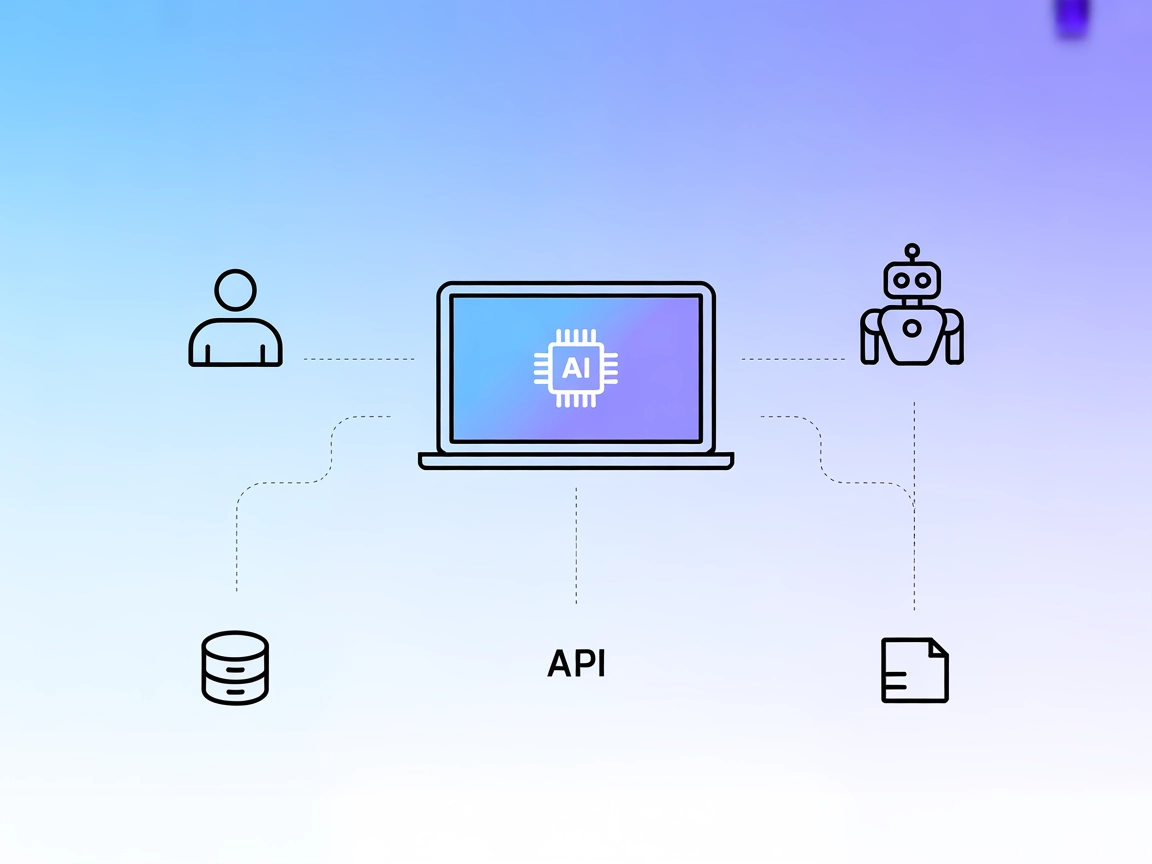
Model Context Protocol (MCP) Server
The Model Context Protocol (MCP) Server bridges AI assistants with external data sources, APIs, and services, enabling streamlined integration of complex workfl...

Connect FlowHunt AI agents to external APIs and databases with the ModelContextProtocol MCP Server for real-time, context-driven automation.
FlowHunt provides an additional security layer between your internal systems and AI tools, giving you granular control over which tools are accessible from your MCP servers. MCP servers hosted in our infrastructure can be seamlessly integrated with FlowHunt's chatbot as well as popular AI platforms like ChatGPT, Claude, and various AI editors.
The ModelContextProtocol (MCP) Server is designed as a bridge to connect AI assistants with a variety of external data sources, APIs, and services. By implementing the Model Context Protocol, this server enables AI clients to augment their capabilities—performing tasks such as querying databases, managing files, and interacting with APIs or other external systems. This integration streamlines development workflows by allowing language models to access, retrieve, and act upon contextual data in real time, thereby improving the relevance and effectiveness of their outputs. The MCP Server empowers developers to standardize LLM interactions, automate complex workflows, and unlock new use cases for intelligent agents.
No explicit prompt templates are listed in the repository files or documentation.
No explicit resources are described in the provided repository section.
No explicit tools are defined in the server.py or visible repository files at the provided URL.
No specific use cases are detailed within the repository section provided.
"mcpServers": {
"modelcontextprotocol": {
"command": "npx",
"args": ["@atlanhq/modelcontextprotocol@latest"]
}
}
"mcpServers": {
"modelcontextprotocol": {
"command": "npx",
"args": ["@atlanhq/modelcontextprotocol@latest"]
}
}
"mcpServers": {
"modelcontextprotocol": {
"command": "npx",
"args": ["@atlanhq/modelcontextprotocol@latest"]
}
}
"mcpServers": {
"modelcontextprotocol": {
"command": "npx",
"args": ["@atlanhq/modelcontextprotocol@latest"]
}
}
Securing API Keys
"mcpServers": {
"modelcontextprotocol": {
"command": "npx",
"args": ["@atlanhq/modelcontextprotocol@latest"],
"env": {
"API_KEY": "${API_KEY}"
},
"inputs": {
"api_key": "${API_KEY}"
}
}
}
Using MCP in FlowHunt
To integrate MCP servers into your FlowHunt workflow, start by adding the MCP component to your flow and connecting it to your AI agent:

Click on the MCP component to open the configuration panel. In the system MCP configuration section, insert your MCP server details using this JSON format:
{
"modelcontextprotocol": {
"transport": "streamable_http",
"url": "https://yourmcpserver.example/pathtothemcp/url"
}
}
Once configured, the AI agent is now able to use this MCP as a tool with access to all its functions and capabilities. Remember to change “modelcontextprotocol” to whatever the actual name of your MCP server is and replace the URL with your own MCP server URL.
| Section | Availability | Details/Notes |
|---|---|---|
| Overview | ✅ | |
| List of Prompts | ⛔ | None listed |
| List of Resources | ⛔ | None listed |
| List of Tools | ⛔ | None listed |
| Securing API Keys | ✅ | |
| Sampling Support (less important in evaluation) | ⛔ | Not specified |
Based on the above summary, the ModelContextProtocol MCP Server provides foundational setup and integration information but lacks details on prompts, resources, tools, and sampling support. It is likely early-stage or only partially documented for public consumption.
This MCP server scores low on documentation completeness, as only setup and overview information is provided. It is likely useful as a starting point, but more detail is needed for out-of-the-box use.
| Has a LICENSE | ⛔ (Not found at this URL) |
|---|---|
| Has at least one tool | ⛔ |
| Number of Forks | ⛔ |
| Number of Stars | ⛔ |
Overall rating: 2/10 (setup instructions are present, but lacking prompt, resource, tool, and usage details).
The MCP Server acts as a bridge, enabling AI agents to interact with external APIs, databases, and services for contextual, real-time actions and data retrieval.
Always use environment variables to store sensitive keys and credentials. Example configuration: { "mcpServers": { "modelcontextprotocol": { "command": "npx", "args": ["@atlanhq/modelcontextprotocol@latest"], "env": { "API_KEY": "${API_KEY}" }, "inputs": { "api_key": "${API_KEY}" } } } }
Add the MCP component to your flow, then configure it by specifying your server details in system MCP configuration. Example: { "modelcontextprotocol": { "transport": "streamable_http", "url": "https://yourmcpserver.example/pathtothemcp/url" } }. Replace with your actual MCP server name and URL.
It standardizes LLM interactions, enables real-time data access, automates workflows, and connects AI agents to virtually any external system or API.
No explicit tools or resources are defined in the current documentation. The server provides foundational integration capabilities but lacks detailed prompts, resources, or tool listings.
Easily connect FlowHunt with external services and data sources using the ModelContextProtocol MCP Server. Standardize interactions and unlock advanced automation.

The Model Context Protocol (MCP) Server bridges AI assistants with external data sources, APIs, and services, enabling streamlined integration of complex workfl...

The interactive-mcp MCP Server enables seamless, human-in-the-loop AI workflows by bridging AI agents with users and external systems. It supports cross-platfor...

Remote MCP (Model Context Protocol) is a system that allows AI agents to access external tools, data sources, and services through standardized interfaces hoste...
Cookie Consent
We use cookies to enhance your browsing experience and analyze our traffic. See our privacy policy.